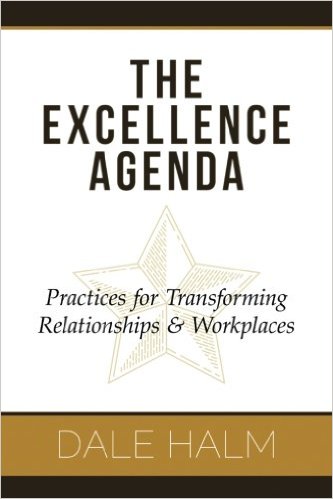Excellence Agenda
Practices for Transforming Relationships & Workplaces
Are you creating excellence in your relationships, in your workplace? This book will forever change how you approach working with others. In The Excellence Agenda, Dale Halm author and renowned business consultant, explores what it takes to truly excel. It reveals the mindset and behaviors needed for optimal performance. By offering a series of thought-provoking questions, this book provides a powerful roadmap for success. It includes:
- The Success Paradigm – alternative ways of thinking that foster collaboration
- Breakthrough Practices – crucial behaviors that lead to exceptional results
- Tools – guidelines for mastering the skills of excellence
- Excellence Survey – 20 questions to help you assess your ability to excel
The Excellence Agenda will inspire you to transform your relationships and workplace.
Featured Posts
January 7, 2021 | Dale Halm
Does Your Agenda Include Excellence?
What’s your organization's agenda? What’s your personal agenda? Most people are unable to provide an immediate, crystal clear response to these questions. Their sense of purpose and how they choose to show up gets muddled in the daily grind of life. This is true for both individuals and organizations.
What is an agenda? It is your indispensable plan or goal that guides your behavior. Your agenda represents the things you must act on in order to accomplish your objectives. If your agenda or your organization’s agenda does not include excellence, you are most likely performing at a sub-optimal level.
What does it take to achieve organizational excellence? Obviously, it takes many things. Most importantly, it takes people who can collaborate in an exceptional manner. I define organizational excellence as the ability to achieve outstanding results by people working together in uncommon and highly-effective ways.
Many companies have brilliant strategies, leading-edge design and manufacturing capabilities, advanced technologies or other competitive advantages. Yet, they fail to operate at true levels of excellence. I have never met a leader who didn't want his or her organization to excel. It's hard to find an employee who doesn't aspire to be part of a prominent organization. If this is what we so strongly desire, why is it so difficult to obtain?
The main reason why most enterprises fail to achieve organizational excellence is because they don't pay attention to what matters most. What matters most is the way people interact, how they work together to produce results, and their ability to shape their own destiny. Whether it’s a relationship between two people or an entire organization, success boils down to two fundamental things. How people think and act − that's culture.
Creating a winning culture is not about attaining an ideal state where everything is perfect. It is not about being content with your relationships, co-workers or workplace. It is about challenging your habitual ways of interacting and applying an alternative approach resulting in higher levels of excellence and more effective relationships.
As American management consultant and author Peter Drucker said, "Culture eats strategy for breakfast."
Think about that for a moment. For a business to prosper, you must implement new processes and realize cost savings. You need to upgrade equipment and technology to stay competitive. But nothing noteworthy will occur without employees working together in highly effective ways. Yet this it is often missing as a stated objective. It's not on the organization’s agenda.
Without talented workers interacting efficiently to produce sustainable results, organizations never maximize their true potential. You simply don't get superior results without people being highly cooperative. Companies like SAS Institute, Google, Quicken Loans, Genentech, NuStar Energy, and Wegmans Food Market, all on Fortune's 2016 Best Companies to Work For list, have cultures where employees approach business and each other differently.
If you look under the hood of companies like these, you'll find cultures of accountability and partnership. The distinction is that individuals in these organizations work together in unique and powerful ways. They emphasize company goals over personal agendas. Team members are honest and direct instead of misleading. Co-workers truly commit to decisions instead of sabotaging them after they are made.
I can assure you, there is nothing ordinary about these behaviors. Companies that establish cultures of excellence understand that employee behavior, not processes or systems, is the ultimate driver of success. So, what's on your organization's agenda?

